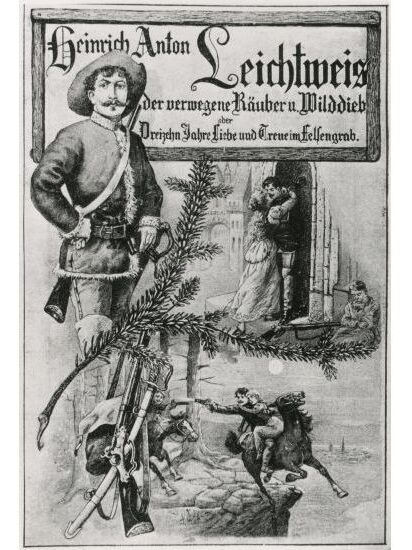Leichtweiß, Heinrich Anton
Light white. Heinrich Anton
Baker, innkeeper, "robber chief"
Born: 29.12.1723 in Jungenheim (near Sprendlingen)
died: 12.03.1793 in Wiesbaden
"...The famous and infamous Heinrich Anton Leichtweiß, the daring robber and gamekeeper of the Rhineland, lived in this rocky cave deep underground. Even today, all strangers who visit the spa town of Wiesbaden flock to the Leichtweiß Cave, the most mysterious robbers' cave in the world..." This is how a Leipzig newspaper reported on the Leichtweißhöhle in Rabengrund in 1880, a popular excursion destination for spa guests at the time.
However, the Leichtweißhöhle near Wiesbaden was by no means the hideout - as was claimed - for a band of robbers under his command or as a storehouse for stolen goods. The actual life of Heinrich Anton Leichtweiß was quite different.
Heinrich Anton Leichtweiß spent his childhood and youth in Mensfelden, later in Ohren near Kirberg in the Taunus. His grandfather, father and brother were hunters in the service of noble lords such as the Limburg Baron von Hohenfeld and the Prince of Nassau-Usingen. Leichtweiß learned the trade of baker and brush maker. He also performed services for the von Hohenfeld family.
Heinrich Anton Leichtweiß came to Wiesbaden as a young man. On September 20, 1757, he married Christiane Louise Nicolay, the daughter of the mayor of Dotzheim. The couple lived in the village of 300 inhabitants with twelve children, some of whom died young. Leichtweiß was the landlord of the "Zum Engel" inn, which also housed the village bakery. Leichtweiß, a stranger to the village, was a thorn in the side of some, especially as he had become wealthy. In 1788, he owned fields, a house and the farm, totaling a debt-free fortune of 4,000 guilders. He was also active as a municipal collector, i.e. he collected money for the manor's treasury.
In April 1788, he was accused of breaking into the cellar of a property belonging to "Conrad Höhnen" after he was found there with "thieving instruments". A break-in for which there was no reasonable explanation. Nothing was stolen. Leichtweiß was arrested on May 1, 1788 and sent to the prison on Michelsberg. A case of this kind should have been heard by the Oberamt. The court, which was actually the court of appeal, took over the case, presumably on the instructions of Prince Karl Wilhelm zu Nassau-Usingen. After the accusation of attempted burglary, the charge was extended to include "poaching" on the basis of witness testimony. Prince Karl Wilhelm zu Nassau-Usingen personally decreed his sentence on the file of the court. In his eyes, Leichtweiß was "certainly a poacher or a venison seller". He had to be put in the pillory next to the town hall steps in Wiesbaden and spend a year in prison. This was indeed an act of princely arbitrariness in the era of absolutism that was coming to an end.
The accused learned of the sentence in prison after he had already served several months there. After his release on October 30, 1789, he did not return to his family in Dotzheim. He never reconnected with his wife and children, but from then on led an "unsettled life" in the Taunus forests at the age of 66.
He hid in the cave named after him after his release from prison. For around two years, he temporarily took refuge here from the inclement weather and the stalking of the princely forest hunters. The cave was probably discovered by lumberjacks in 1791, who had become aware of it due to rising smoke; however, the "robber Leichtweiß" was not there.
In November 1791, Leichtweiß was apprehended in the Hessian office of Bergen, which decided not to prosecute him. Leichtweiß was once again sent to prison in Wiesbaden and a subsequent suicide attempt was prevented. There was no trial, neither before the criminal court nor the court of justice. Prince Karl Wilhelm "solved" the problem on February 29, 1792, writing that Leichtweiß was a "rogue who had fallen into misery through his own fault". Even his family wanted "him to be imprisoned for life". There was no evidence to support this claim.
Heinrich Anton Leichtweiß did not learn that the prince wanted him to remain in prison until his death. Month after month, the prison's neatly kept supervision book read: "Crime: pro furti" - for theft. Under the heading "For how long?" it read: "Still undergoing inquisition." Leichtweiß lived until the end in the belief that there would be a proper trial that would establish his innocence. The wealthy Engelwirt from Dotzheim was a broken man.
From May 1792, the entry "Sits in particular and does not work" can be found month after month under "Types of work". He just brooded dully to himself. Leichtweiß died in prison at the age of 70. His funeral cost three guilders and 14 albus (white pennies). Two guilders of this went on the coffin. The two prison guards received "one gulden 15 albus for the final dressing, grave making ...". Leichtweiß was buried on the Schulberg outside the walls of the cemetery.
Literature
Heinrich Anton Leichtweiß. A citizen's life in the 18th century. Schriftenreihe des Heimat- und Verschönerungsvereins Dotzheim e. V., (2nd revised and expanded edition), Wiesbaden 1990. A 3rd edition with an expanded picture section was published in Wiesbaden in 2006.
